To commemorate the 100th anniversary of Vietnam Revolutionary Press Day (June 21, 1925 – 2025), a delegation from the Vietnam Journalists’ Association (VJA), led by Mr. Le Quoc Minh, Member of the Party Central Committee, Deputy Head of the Party Central Committee’s Commission for Information and Education and Mass Mobilization, Editor-in-Chief of Nhan Dan Newspaper, and President of the VJA, visited this historically significant site. The visit took place from June 11 to 13.
    |
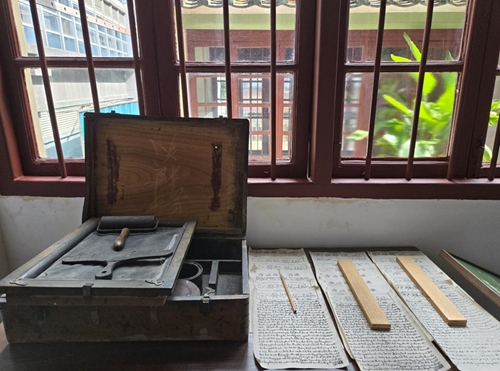 |
|
The printing press used by leader Nguyen Ai Quoc - Ho Chi Minh to publish the Thanh Nien Newspaper in Guangzhou City, Guangdong Province, China |
After a flight of nearly two hours from Hanoi, we arrived in Guangzhou. Amid the bustling streets of this modern city, it is hard to imagine that a century ago, in a modest house on Wenming Street, Nguyen Ai Quoc - Ho Chi Minh launched Vietnam’s first revolutionary newspaper. Hand-printed in chu quoc ngu (the Romanized Vietnamese script), Thanh Nien’s inaugural issue was published on June 21, 1925.
Today, House No. 13 on Wenming Street (now No. 248–250) remains preserved as a historic testament to the special bond, “comrades and brothers,” between the two Parties and peoples of Vietnam and China, and between their revolutionary presses in particular. It was here that Nguyen Ai Quoc manually edited and printed Thanh Nien, using it to disseminate Marxist-Leninist ideology and illuminate the path toward national liberation.
    |
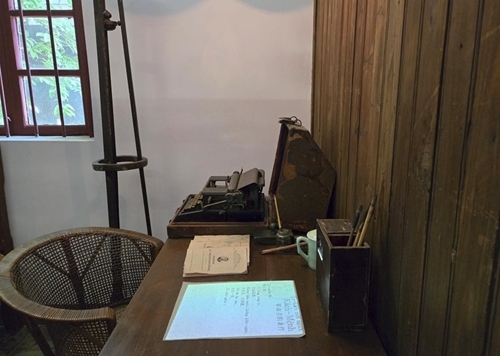 |
|
The desk, typewriter, and documents used by leader Nguyen Ai Quoc - Ho Chi Minh during his time living and working at House No.13, Wenming Street, Guangzhou City (1924-1927) |
The founding of Thanh Nien was not only a powerful ideological tool for Vietnamese communists, but this very place also served as the first “school” to train the movement’s core cadres. From these early classes emerged many who would become leaders, generals, and pioneering revolutionary journalists.
Visiting the site where President Ho Chi Minh once lived, trained revolutionary cadres, and worked on journalism, we were overcome with emotion. Words could hardly express the thoughts and sentiments shared among the delegation. Each item preserved here stirred personal reflections and aspirations.
    |
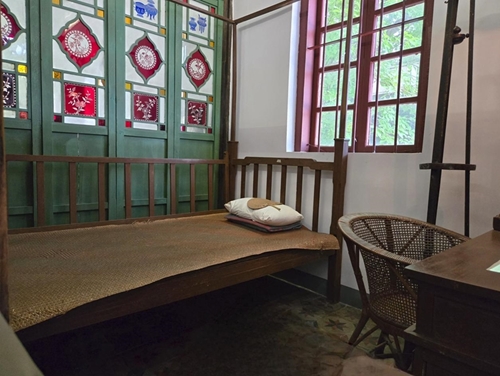 |
|
The small room in House No.13, Wenming Street, Guangzhou City, where leader Nguyen Ai Quoc - Ho Chi Minh lived and worked (1924–1927). |
According to Mr. Nguyen Ngoc Son, Editor-in-Chief of the Thai Nguyen Newspaper, the visit marked a return to the starting point of a historic journey, a nation’s transformation from colonial bondage to independence and freedom; from a hand-printed paper to today’s robust revolutionary press. From these humble beginnings, President Ho Chi Minh and his fellow revolutionaries sparked a spirit of resistance and planted the seeds of belief in a brighter future through scientific and revolutionary methods.
Over the past century, the Vietnamese revolutionary press has developed alongside the nation’s struggles and triumphs, from Viet Bac to Dien Bien, from Dien Bien Phu to Ho Chi Minh City, from the Truong Son mountains to the Truong Sa (Spratly) Islands. It has accompanied the country from resistance to reconstruction, and now, through the path of renewal. Today, under the leadership of the Communist Party of Vietnam, the revolutionary press continues to move forward with the nation.
The past 100 years have been marked by the achievements, courage, wisdom, and talent of generations of journalists who helped carry the nation's story. Many made the ultimate sacrifice alongside soldiers in the resistance wars; others gave their lives in the effort to build and protect the Socialist Republic of Vietnam. They were not just reporters; they lived the truth, fought with words, and chronicled the heartbeat of the nation.
    |
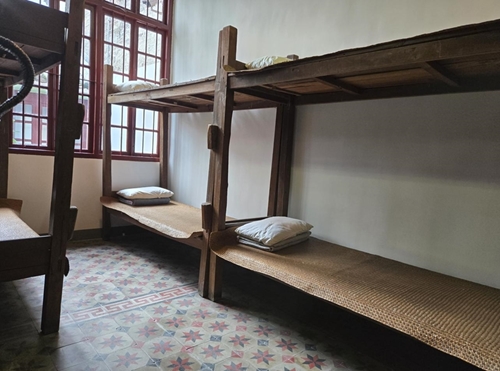 |
|
The resting area for political training students under leader Nguyen Ai Quoc - Ho Chi Minh’s instruction in Guangzhou City (1924–1927) |
The spirit of dedication, integrity, and revolutionary conviction among generations of Vietnamese journalists originates from Thanh Nien, the very newspaper President Ho Chi Minh personally wrote, designed, and printed a century ago.
In today’s fast-changing world, driven by technology, artificial intelligence, digital platforms, and social media, the revolutionary press faces both challenges and opportunities. Yet the core values of Thanh Nien endure: journalism as a tool of ideology, enlightenment, public voice, and a vanguard force in defending the Fatherland on the cultural and ideological front.
    |
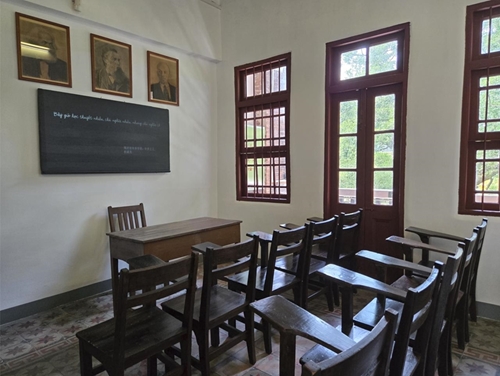 |
|
The revolutionary cadre training class taught directly by leader Nguyen Ai Quoc - Ho Chi Minh in Guangzhou City (1924–1927) |
The commitment to truth, revolutionary service, and the people, together with the vision, intellect, and determination that President Ho Chi Minh instilled in Thanh Nien, continues to inspire generations of Vietnamese journalists. These values are the cornerstone for the revolutionary press to uphold its pioneering role in conveying Party policies, state laws, and the people's voices; in mobilizing national unity; and in strengthening the “people’s hearts posture” for national defense.
In today’s context, Vietnamese journalists must fortify their political foundation, maintain professional ethics, and enhance strategic thinking. Their mission is not only to report swiftly and accurately, but also to guide public opinion, uphold truth, promote humanitarian and patriotic values, and foster public trust in the Party, the State, and socialism. This is the vision of Vietnam’s revolutionary press, rooted in the legacy of Thanh Nien created by President Ho Chi Minh.
    |
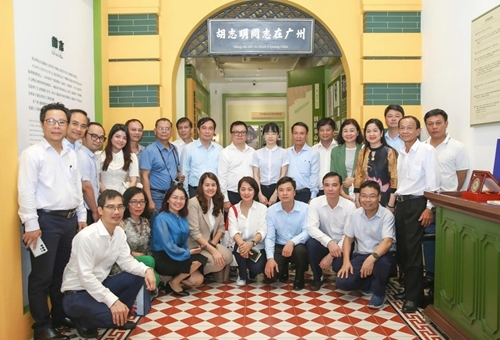 |
|
The VJA delegation visits the site where the Thanh Nien Newspaper was first published by leader Nguyen Ai Quoc - Ho Chi Minh. |
The VJA delegation’s trip to Guangzhou was more than a commemorative event, it was a spiritual journey. Returning to where President Ho Chi Minh laid the foundations for Vietnam’s revolutionary press served as a powerful reminder to today’s journalists of their noble calling: to serve the nation and its people. Journalism is not just a profession, it is a mission to pursue truth and uphold the ideals of the people and the country.
We returned to Hanoi with deep gratitude and renewed confidence in the revolutionary path forged by the Party, President Ho Chi Minh, and generations of pioneering journalists, and in the strength, intellect, and integrity of today’s press corps.
From its origin in Guangzhou to today, a centennial journey, it is a proud chronicle of Vietnam’s will, ideals, and aspirations. And that journey continues, like a river that never stops flowing.
Translated by Trung Thanh